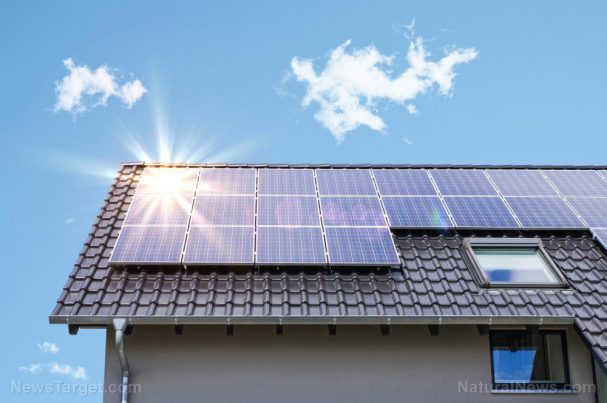
Corporations now trying to charge people for choosing solar energy
Tuesday, August 10, 2021 by Divina Ramirez
http://www.naturalnewsreports.com/2021-08-10-corporations-charging-people-for-going-green.html

Kansas holds just as much solar potential as Florida, also called the Sunshine State. Yet Kansas lags far behind, powering about 12,000 homes — less than two percent of the homes running on solar power in Florida. Local solar proponents point out that strong pushback from power companies in Kansas is to blame.
Evergy, the dominant electric utility in Kansas, has vastly expanded wind power in the state. However, it’s advocating for policies that involve collecting fees from customers with rooftop solar panels, possibly because these individuals no longer need to buy as much energy from the utility company as they previously did.
This situation isn’t unique to Kansas. Similar fights have played out in other states, such as Arizona, California and Massachusetts. It would appear that the emerging conflict between power companies and users with solar arrays stems from the former being threatened by the latter’s transition to clean energy.
Kansas utility company attempts to charge solar customers
In 2018, Evergy got permission from state regulators to charge users with rooftop solar arrays. However, it did not last long as the highest court in the state ruled that it was illegal. Evergy went back to regulators hoping to collect different fees from rooftop solar users: a grid access charge and a minimum monthly bill.
Regulators at the Kansas Corporation Commission (KCC) rejected both proposals and told the utility company to work with local solar proponents instead to come up with a favorable compromise. Unfortunately, it doesn’t look like the company will budge any time soon.
Kevin Good, owner and president of a small solar power company in Kansas, remarked that he got into solar at the worst point to do so in the last 50 years. Good runs Good Energy Solutions in Lawrence, a relatively small city of about 100,000 in the northeastern sector of the state.
Early this year, KCC Chair Andrew French said Kansas wasn’t the only state facing a standoff surrounding solar, particularly about reworking net metering policies.
“This is not an issue unique to Kansas,” said French. Various states have implemented net metering.
Net metering is a billing mechanism that credits solar array owners for the electricity they add back to the grid. During the day, most rooftop solar users produce more electricity than they consume. Net metering allows them to put that excess electricity in the grid and reduce their future electric bills. In some cases, the electricity is used to serve nearby customers’ loads.
But other experts weren’t as ambivalent about power companies’ strong pushback on the usage of rooftop solar arrays. Rick Gillam, a program director with the national solar advocacy group Vote Solar, said Evergy is like many other utility companies that oppose customers’ efforts to reduce their usage of utility-supplied electricity. (Related: Power companies are waging a secret war against solar.)
“[Evergy’s] general animosity has created uncertainty for solar developers and customers alike,” said Gillam.
For years, utility companies have fought against net metering because it reduces their profits. If customers use their own solar arrays, they won’t need to pay for utility-supplied electricity. Worse, they get to save extra money on future electric bills by putting the extra electricity they generate back into the power grid.
The ability of customers to generate their own electricity also inadvertently threatens utility companies’ monopoly of power. Consequently, fears over losing customers and profits have caused companies like Evergy to turn to dubious billing strategies to recoup the money they lose from customers who no longer rely on the grid.
Dorothy Barnett, executive director of the Kansas-based nonprofit Climate + Energy Project, said corporations’ profit-driven motivations have stalled the state’s progress on the transition to clean energy for years.
“We could have worked together to find common ground and could have been so far ahead on solar,” remarked Barnett. “There were so many opportunities along the way that were missed because Kansas utilities were slow to recognize we are in a period of transition with our electric system.”
The transition of many customers to solar power might have also been partly influenced by their inability to pay utility bills amid the coronavirus pandemic. By saving money on electricity, they’re able to spend the money they would have used to pay electric bills on more important resources, such as food, water and gasoline.
Follow Power.news to learn more about how power companies are charging people for going green.
Sources include:
Tagged Under: Tags: electric grid, electricity, energy, kansas, power, power supply, powergrid, renewable energy, solar electricity, solar power, sustainable living
RECENT ARTICLES


Four FBI agents found to have paid PROSTITUTES while on overseas duty
By Ramon Tomey

Russia threatens to deploy intermediate-range nuclear missiles in Europe as tension with US escalates

Medical martial law: Military taking over hospitals in FOUR states after thousands of nurses were fired for having natural immunity and refusing spike protein injections
By Ethan Huff

Hospitals are retracting their COVID-19 vaccine mandates due to federal court rulings and labor shortages
COPYRIGHT © 2017 NATURAL NEWS REPORTS


